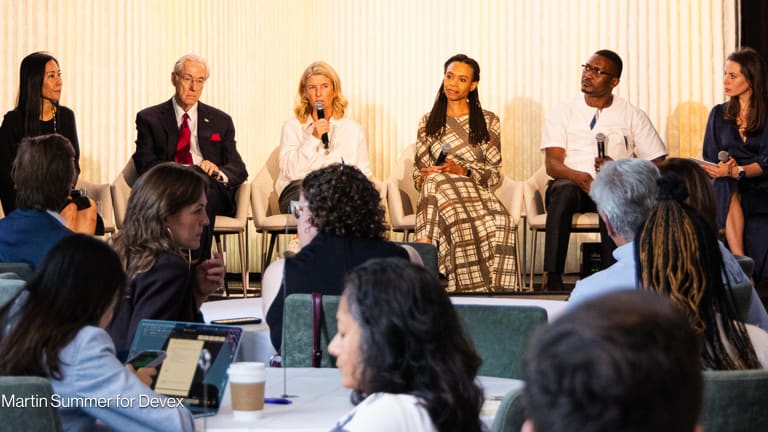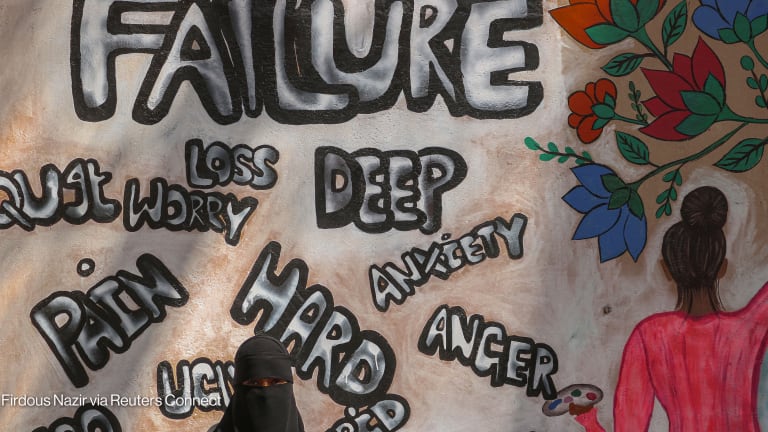
MANILA — Brad Herbert hopes to raise $10 billion for a new global initiative set to launch in 2021 at Davos. But with the coronavirus creating a global economic crisis, he is aware raising funds is going to be a huge challenge.
In June, the World Bank projected the global economy to shrink 5.2% in 2020, plunging most countries into recession. Global growth could rebound by 2021, but the outlook remains uncertain. A number of NGO leaders are already facing fundraising challenges, with some anticipating reduced aid levels in the coming year.
But Herbert, who sits as the interim CEO at the Healthy Brains Global Initiative — a global financing mechanism that aims to fuel research on neurological and mental health disorders — finds that it’s important to get started. COVID-19 has created conditions that impact the mental health of populations globally. If action is not taken to curb this, he said the world economy could lose trillions to mental disorders in the next decade, more than the projected $6 trillion by 2030.
“We all are either ignoring mental health, we're trying to bury our heads in the sand, or there’s stigma, the culture, or the lack of political will to make investments in this.”
— Brad Herbert, interim CEO, Healthy Brains Global Initiative“Rather than putting things on hold, it makes me want to go faster. Because if we don't flatten the COVID-19 mental health curve, all we're going to be doing is bringing the [$6 trillion] cost to the global economy ... forward,” he told Devex.
Compared to the cost of mental health disorders to the global economy, $10 billion is a “pittance,” he said.
Getting started
HBGI aims to fund basic, translational, and implementation research on mental and neurological disorders. It takes inspiration from established multilateral institutions in global health, such as The Global Fund to Fight AIDS, Tuberculosis and Malaria, where Herbert used to be chief of operations. He plans to apply some of the policies he helped introduce or witnessed during his time at The Global Fund to HBGI, such as performance-based funding and having people affected by the disease or condition as part of the decision-making processes.
At The Global Fund, communities affected by HIV, tuberculosis, and malaria are represented by individuals who’ve lived with the experience as voting members of the board.
“At HBGI, I have made a strong commitment based on that experience that people with lived experiences with mental health, either directly or indirectly ... would become an essential part of our DNA. It would affect all aspects of how HBGI works,” Herbert said.
Which bilateral donors are supporting mental health? (Pro)
Devex explores funding data from 2019 to highlight the key bilateral donors supporting this crucial but underfunded area of global health.
The initiative is currently seeking applications from people who experience mental health or neurological challenges — such as but not limited to those with epilepsy, traumatic brain injuries, schizophrenia, bipolar disorders, anxieties, and depression — to have a voice in HBGI’s work as part of a Lived Experience Council.
While new to the sector, Herbert said he realized there wasn’t a lot of communication or engagement happening between researchers and those suffering from mental health conditions. Clinical trials also don’t always involve people with mental or neurological health conditions, he added.
One of the main focuses of HBGI’s work will be in funding research to generate knowledge and eliminate barriers to scaling up mental health treatment and interventions in low- and middle-income countries. A number of treatments have been proven to work in the laboratory and during clinical trials, but they don’t seem to work as effectively during implementation.
“Is it cultural? you know, there [are] many cultures [where] the stigma is so high, nobody will admit there's mental illness. Is it a lack of political will? Is it a lack of technology? Is it a lack of resources? Or is it the social determinants within society … that don't allow for an openness to address mental health?” said the HBGI chief.
In the early days of The Global Fund, Herbert witnessed how stigma was so high against people living with HIV and AIDS that testing and counseling were a challenge. People who tried to get tested for HIV ran the risk of getting beaten up or losing their jobs.
The organization will also promote and support research in high-income economies, as similar barriers could exist for populations across the world when it comes to accessing mental health services. Every country is a developing country when it comes to mental health, he said.
“We all are either ignoring mental health, we're trying to bury our heads in the sand, or there’s stigma, the culture, or the lack of political will to make investments in this,” he said.
“There's enough research to indicate that a lot of dementia and Alzheimer's actually is a result of ... disorders that happen in youth and adolescent age.”
— Brad Herbert, interim CEO, Healthy Brains Global InitiativeThe initiative will cover a wide range of mental and neurological disorders, although it plans to focus on youth and adolescents in the near-term.
“We [realize] very early on, if we tried to do everything at once, we would do nothing. So we decided on youth and adolescence because there's enough research to indicate that a lot of dementia and Alzheimer's actually is a result of ... disorders that happen in youth and adolescent age,” Herbert said.
Managing expectations
Herbert isn’t expecting to raise $10 billion right away. But he thinks it’s possible to raise at least $100 million within a year, out of a target of $500 million, to start work on the mental health challenges posed by COVID-19, based on conversations he’s having with different foundations and those involved in philanthropy.
“It's not your traditional international development where the World Bank comes in, and the donors come in. It's a combination of philanthropy, foundations, high net worth individuals, family foundations. I'm talking to people who have written checks for $100 million — not to us yet. But we've engaged and they've given us startup money,” he said.
He hopes he will be able to raise enough money to fuel and sustain HBGI’s core work for the next five years. This could include the use of innovative financing mechanisms, such as bonds. Governments in high-income countries could issue bonds to beef up their mental health research, and then share their learnings with other countries under a collaborative agreement facilitated by HBGI.
Herbert admits it’s difficult to raise funds, especially amid COVID-19. But he’s hopeful. “When people realize the cost of COVID [is] beyond the physical costs … I think they're going to at least be open to the conversation. And that’s what keeps me up at night.”








